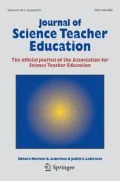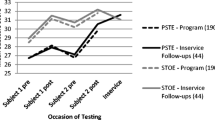Abstract
This study investigated contextual changes in perceptions of science teaching self-efficacy through pre-, post- and retrospective administrations of the Science Teaching Expectancy Belief Instrument (STEBI-B) among preservice elementary teachers when exposed to a science teaching methods course. Findings revealed that the number of postsecondary science courses completed, and prior school science experiences had a significant main effect on personal science teaching efficacy (PSTE) but not science teaching outcome expectancy (STOE). There was no evidence for significant interaction effects between variables on both efficacy subscales. The implications of this study relate to organization, structure, and dynamics of elementary science teacher preparation.
Similar content being viewed by others
References
Allinder, R. M. (1994). The relationship between efficacy and the instructional practices of special education teachers and consultants. Teacher Education and Special Education, 17(2), 86–95.
Appleton, K. (1995). Student teachers’ confidence to teach science: Is more science knowledge necessary to improve self-confidence? International Journal of Science Education, 17(3), 357–369.
Appleton, K. (2003). How do beginning primary school teachers cope with science? Toward an understanding of science teaching practice. Research in Science Education, 33(1), 1–25.
Appleton, K. (2006). Elementary science teacher education: International perspectives on contemporary issues and practice. Mahwah, NJ: Lawrence Erlbaum Associates.
Ashton, P. T., & Webb, R. B. (1986). Making a difference: Teachers’ sense of efficacy and student achievement. New York: Longman.
Bandura, A. (1977). Self-efficacy: Toward a unifying theory of behavioral change. Psychological Review, 84, 191–215.
Bandura, A. (1986). Social foundations of thought and action: A social cognitive theory. Englewood Cliffs, NJ: Prentice-Hall.
Bandura, A. (1997). Self-efficacy: the exercise of control. New York: W. H. Freeman.
Beeth, M. E., & Adadan, E. (2006). The influences of university-based coursework on field experience. Journal of Science Teacher Education, 17(2), 103–120.
Bleicher, R. E. (2004). Revisiting the STEBI-B: Measuring self-efficacy in preservice elementary teachers. School Science and Mathematics, 104(8), 383–391.
Bleicher, R. E. (2007). Nurturing confidence in preservice elementary science teachers. Journal of Science Teacher Education, 18(6), 841–860.
Bleicher, R. E., & Lindgren, J. (2005). Success in learning science and preservice science teaching self-efficacy. Journal of Science Teacher Education, 16, 205–225.
Brand, B. R., & Wilkins, L. M. (2007). Using self-efficacy as a construct for evaluating science and mathematics methods courses. Journal of Science Teacher Education, 18, 297–317.
Bray, J. H., & Howard, G. S. (1980). Methodological considerations in the evaluation of a teacher-training program. Journal of Educational Psychology, 72(1), 62–70.
Bray, J. H., Maxwell, S. E., & Howard, G. S. (1984). Methods of analysis with response-shift bias. Educational and Psychological Measurement, 44(4), 781–804.
Cantrell, P. (2003). Traditional vs. retrospective pretests for measuring science teaching efficacy beliefs in preservice teachers. School Science and Mathematics, 103(4), 177–185.
Cantrell, P., Young, S., & Moore, A. (2003). Factors affecting science teaching efficacy of preservice elementary teachers. Journal of Science Teacher Education, 14, 177–192.
Carter, W., & Sottile, J. M. (2002). Changing the “ecosystem” of preservice math and science methods classes to enhance students’ social, cognitive, and emotional development. Paper presented at the annual meeting of the Eastern Educational Research Association, Sarasota, FL.
Claxton, G. (1992). Why science education is failing. New Scientist, 133(1804), 45–46.
Cochran, K. F., King, R. A., & DeRuiter, J. A. (1993). Pedagogical content knowledge: A tentative model for teacher preparation. Journal of Teacher Education, 44, 263–272.
Cronbach, L. J., & Furby, L. (1970). How we should measure “change”–or should we? Psychological Bulletin, 74(1), 68–80.
Driver, R., & Oldham, V. (1986). A constructivist approach to curriculum development in science. Studies in Science Education, 13, 105–122.
Enochs, L., & Riggs, I. M. (1990). Further development of an elementary science teaching efficacy belief instrument: A preservice elementary scale. School Science and Mathematics, 90, 694–706.
Etkina, E., Mestre, J. P., & O’Donnell, A. (2005). The impact of cognitive revolution on science teaching and learning. In J. M. Royer (Ed.), The cognitive revolution in educational psychology (pp. 119–164). Greenwich, Connecticut: Information age publishing.
Fink, D. L. (2003). Creating significant learning experiences. San Francisco: Jossey-Bass.
Fulp, S. L. (2002). Status of elementary school teaching. Chapel Hill, North Carolina: Horizon Research, Inc.
Gibson, S., & Dembo, M. H. (1984). Teacher efficacy: A construct validation. Journal of Educational Psychology, 76, 569–582.
Ginns, I. S., & Watters, J. J. (1990). A longitudinal study of preservice elementary teachers’ personal and science teaching efficacy (Research/Technical No. ED 404 127).
Guskey, T. R. (1988). Teacher efficacy, self-concept, and attitudes toward the implementation of instructional innovation. Teaching &Teacher Education, 4(1), 63–69.
Howard, G. S., & Dailey, P. R. (1979). Response-shift bias: A source of contamination of self-report measures. Journal of Applied Psychology, 64(2), 144–150.
Howard, G. S., Ralph, K. M., Gulanick, N. A., Maxwell, S. E., Nance, D., & Gerber, S. L. (1979). Internal validity in pretest-posttest self-report evaluations and re-evaluation of retrospective pretests. Applied Psychological Measurement, 16, 129–135.
Jarrett, O. S. (1999). Science interest and confidence among preservice elementary teachers. Journal of Elementary Science Education, 11(1), 49–59.
Jay, J. S. (2000). Preservice early childhood teachers’ science teaching self-efficacy: The effects of a modeling-microteaching intervention. Unpublished PhD, University of Missouri, Columbia.
Johnston, J. D. (2003). Active learning and preservice teacher attitudinal change. Paper presented at the Annual Meeting of the Mid-South Educational Research Association. Biloxi, MS.
Levitt, K. E. (2001). An analysis of elementary teachers’ beliefs regarding the teaching and learning of science. Science Education, 86, 1–22.
Linn, R. L., & Slinde, J. A. (1977). The determination of the significance of change between pre-and posttesting periods. Review of Educational Research, 47(1), 121–150.
Lockman, A. S. (2006). Changes in teacher efficacy and beliefs during a one-year teacher preparation program. Unpublished PhD, The Ohio State University.
Mestre, J. P. (2001). Implications of research on learning for the education of prospective science and physics teachers. Physics Teacher, 36(1), 44–51.
Moore, R. (2003). Re-examining the field experiences of preservice teachers. Journal of Teacher Education, 54, 31–42.
Moore, J. J., & Watson, S. B. (1999). Contributors to the decision of elementary education majors to choose science as an academic concentration. Journal of Elementary Science Education, 11, 37–46.
Mulholland, J., Dorman, J. P., & Odgers, B. M. (2004). Assessment of science teaching efficacy of preservice teachers in an Australian university. Journal of Science Teacher Education, 15(4), 313–331.
National Research Council. (1990). Fulfilling the promise: Biology education in the nations schools. Washington, DC: National Academy Press.
National Research Council. (1996). National science education standards. Washington, DC: National Academy Press.
Palmer, D. (2002). Factors contributing to attitude exchange amongst preservice elementary teachers. Science Education, 86(1), 122–138.
Palmer, D. (2006). Durability of changes in self-efficacy of preservice primary teachers. International Journal of Science Education, 28(6), 655–671.
Plourde, L. A. (1999). Preservice elementary teachers’ personal science teaching efficacy and science teaching outcome expectancies: The influence of student teaching. Unpublished PhD, University of Hawai’i at Manoa.
Plourde, L. A. (2002). Elementary science education: The influence of student teaching–where it all begins. Education, 123(2), 253–261.
Ramey-Gassert, L., & Shroyer, M. G. (1992). Enhancing science teaching self-efficacy in preservice elementary teachers. Journal of Elementary Science Education, 4, 26–34.
Riggs, I. M. (1988). The development of an elementary teachers’ science teaching efficacy belief instrument. Unpublished PhD, Kansas State University.
Roth, W. M., & Tobin, K. (2001). Learning to teach: Science as practice. Teacher and Teacher Education, 17, 741–762.
Schoon, K. J., & Boone, W. J. (1998). Self-efficacy and alternative conceptions of science of preservice elementary teachers. Science Education, 82, 553–568.
Schoon, K. J., & Sandoval, P. A. (1997). The seamless field experience model for secondary science teacher preparation. Journal of Science Teacher Education, 8(2), 127–140.
Thompson, A. G. (1992). Teachers’ beliefs and conceptions: A synthesis of the research. In D. A. Grouws (Ed.), Handbook of research on mathematics teaching and learning (pp. 127–146). New York: Macmillan.
Tilgner, P. J. (1990). Avoiding science in the elementary school. Science Education, 74(4), 421–431.
Tobias, S. (1997). Some recent developments in teacher education in mathematics and science: A review and commentary. Arlington, VA: National Science Foundation.
Tobin, K., Tippins, D. J., & Gallard, A. J. (1994). Research on instructional strategies for teaching science. In D. L. Gabel (Ed.), Handbook of research on science teaching and learning (pp. 45–93). New York: MacMillan.
Tosun, T. (2000). The impact of prior science course experience and achievement on the science teaching self-efficacy of preservice elementary teachers. Journal of Elementary Science Education, 12, 21–31.
Trigwell, K., Martin, E., Benjamin, J., & Prosser, M. (2000). Scholarship of teaching: A model. Higher Education Research & Development, 19(2), 155–168.
Tschannen-Moran, M., Hoy, A. W., & Hoy, W. K. (1998). Teacher efficacy and measure. Review of Educational Research, 68, 202–248.
Watters, J. J., & Ginns, I. S. (1994). Self-efficacy and science anxiety among preservice primary teachers: Origins and remedies. Research in Science Education, 24(1), 348–357.
Wigfield, A., Galper, A., Denton, K., & Seefeldt, C. (1999). Teachers’ beliefs about former head start and non-head start first-grade children’s motivation, performance, and future educational prospects. Journal of Educational Psychology, 91, 98–104.
Woolfolk, A. E., & Hoy, W. K. (1990). Prospective teachers’ sense of efficacy and beliefs about control. Journal of Educational Psychology, 82(1), 81–91.
Young, B. J., & Kellogg, T. (1993). Science attitudes and preparation of preservice elementary teachers. Science Education, 77, 279–291.
Acknowledgements
The author thanks Drs. Mark Guy, Randall Bowden, Steven LeMire, and Tim Young for their valuable contributions, mentorship, and support of this work.
Author information
Authors and Affiliations
Corresponding author
About this article
Cite this article
Hechter, R.P. Changes in Preservice Elementary Teachers’ Personal Science Teaching Efficacy and Science Teaching Outcome Expectancies: The Influence of Context. J Sci Teacher Educ 22, 187–202 (2011). https://doi.org/10.1007/s10972-010-9199-7
Published:
Issue Date:
DOI: https://doi.org/10.1007/s10972-010-9199-7




